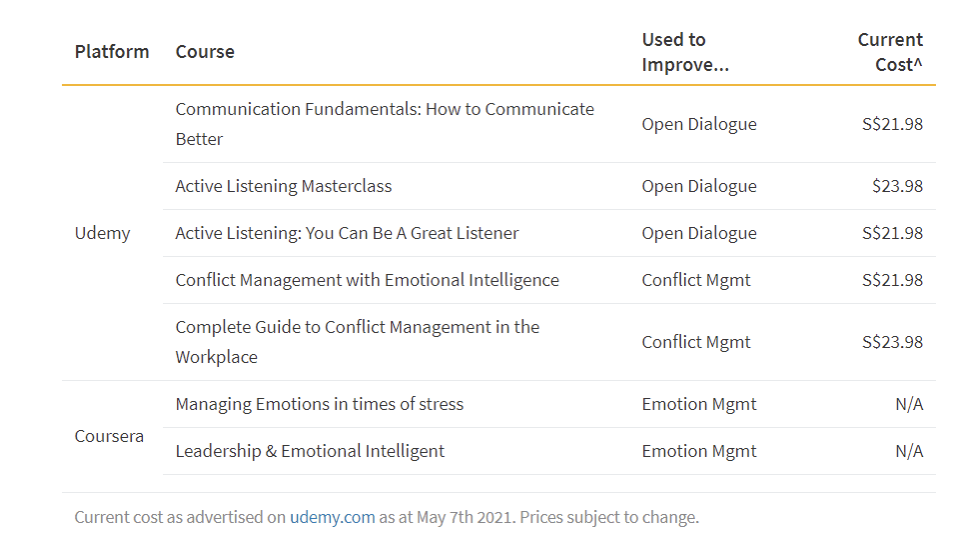Like most professionals, you’re probably not looking to stay in the same position for the rest of your career. Maybe you’re already brainstorming ways to move up the career ladder and land your dream job.
However, most people think that the best way to get promoted is by learning new hard skills or working overtime. But there’s another important component that will convince your boss you’re ready to move up. Interpersonal skills — the ability to interact and get along with others — is oft overlooked. Yet according to a study done by Vitalsmarts, a corporate training and leadership development firm, 92% of respondents said that having poor interpersonal skills will hinder an employee’s career progression.
To help you put your best foot forward, we discuss 4 important interpersonal skills you should develop if you want to impress your boss and get that promotion.
1. Managing negative emotions
Letting your emotions get the best of you in the workplace can lead to unfortunate spats with your colleagues, a visibly poor attitude and rash decision making. Furthermore, being led by our emotions also often causes us to prioritise feelings over facts, often leading us to make decisions based on our emotional state rather than the hard facts. This can be dangerous as emotional actions can lead to biases, oversight and costly mistakes.
If your boss sees that you can manage negative emotions and stick to facts, they’ll feel confident in trusting you with difficult situations. They’ll also see you as someone who is able to put their feelings aside to focus on what needs to be done to move the company forward—without giving in to bias.
Some emotions that can be difficult to deal with in the workplace include frustration, anger, worry and insecurities, feeling down and negative attitudes towards others. Once you recognise any of these emotions, it’s important to find out what triggered them and then focus on either removing the trigger or moving past it appropriately. If your negative feelings were triggered by a colleague, then you can take a second to relax and then calmly give them constructive feedback.
However, all of this is not to say that you should suppress your emotions. Instead, it’s important to acknowledge your negative emotions and solve them openly. It’s also important to foster positive emotions within your team, which will make for a more creative, productive and less stressed work environment.
2. Conflict management
Conflict in the workplace encapsulates everything from small disagreements of opinion, to larger issues like a problem with a client. Being able to de-escalate conflicts is another key factor that managers look at when considering your promotion. Whether you’re dealing with an unhappy client or disagreements with your team, stepping in and taking charge calmly and effectively signals to your boss that you are a dedicated problem-solver.
In fact, a report by Udemy found that conflict management is the top soft skill that was trending among its users, making employees who excel at this skill to be a valuable asset to any team.
If you’ve never dealt with conflict in the workplace before, you’ll need three skills to get started: Self-awareness, collaboration and promotion of a productive work environment. When conflict occurs, you will need to identify the root of the issue, collaborate with the third-party to find a potential solution, promote that solution and apply it to avoid future problems.
Lastly, you’ll need to remember that conflict resolution doesn’t focus on right vs. wrong, but instead works towards coming to an agreement.
3. Empathy
Empathy, or the ability to share and understand the feelings of others, is one of the most important interpersonal skills you can have in the workplace. In the face of conflict, the common instinct would be to get defensive and argue your point. However, being empathetic neutralises the negativity and identifies the common ground by putting yourself in your colleague’s shoes.
When you are actively empathising, you are seeing past the initial emotional reaction and are attempting to see what is happening behind the scenes to solve interpersonal issues. Once you are able to see things from the other person’s perspective, you will be able to identify and solve the problems effectively without putting down your coworker or creating additional conflicts.
Showing that you are an empathetic worker is crucial for managerial promotions and studies have shown that empathetic managers are viewed as better performers at their jobs. Mid-level managers who want to move upwards can show additional empathy by watching for signs of overwork, showing interest in needs and dreams, willingness to help with personal problems and showing compassion.
4. Open dialogue
If you want to show your boss you’re an effective leader, then you’ll need to show him that you are able to take in multiple perspectives and engage in open dialogue. This also shows that you are not being led by your ego, but that you are willing to let others have a say and engage with their ideas. When you engage in open dialogue, you are curious, non-judgmental, present and listening to the other person. There is no hidden agenda and you work towards guiding the conversation through open-ended questions.
If you are looking for a promotion that will land you in a leadership position, showing that you know how to foster an open dialogue with your colleagues and managers will be crucial in proving that you will put your team and the company’s best interests ahead of your own.
How to build up soft skills
If you want to improve your interpersonal skills, sites like Udemy and Coursera provide a plethora of different courses for developing the soft skills mentioned above. Most courses at Udemy cost less than $50 when they’re on sale and you are able to complete them in just a few hours’ time.

Some courses may even be free or are eligible for the $500 MySkillsFuture credit. If you feel like you already excel in these skills and want to learn others, then you can consider moving towards making use of traineeship opportunities and enhancing your technical skills to make an even stronger case for why you deserve that promotion.
The article is contributed by ValueChampion Singapore.















